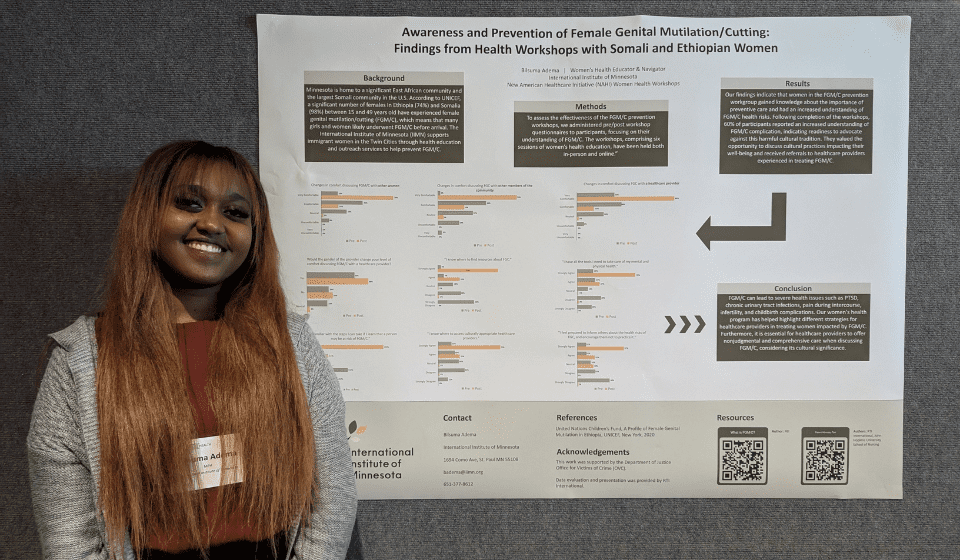FGM/C & Women’s Health

FGM/C education results presented at North American Refugee Health Conference
August 14, 2024 | Over the past year, the Institute taught six health workshops with Somali and Ethiopian women, focused on raising awareness, preventing female genital mutilation/cutting (FGM/C), and connecting impacted women to healthcare providers. We’re encouraged by the outcomes of our work and recently shared our results at the North American Refugee Health Conference (NARHC).
“We have significantly contributed to changing perspectives on how women view their health and their confidence in taking a stand to protect their wellbeing from harmful practices like female genital mutilation/cutting,” said Bilsuma Adema, the Institute’s Women’s Health Educator who presented on the workshop’s outcomes.
What is FGM/C?
Female genital mutilation/cutting involves partial or total removal of the external female genitalia or other injuries to the female genital organs for non-medical reasons. It is illegal in the United States and “there is no exception for performing FGM/C as a matter of religion, custom, tradition, ritual or standard practice,” according to the FBI.
It is a human rights violation that has no health benefits for girls and women, and can cause severe bleeding, problems urinating, later cysts, infections, as well as complications in childbirth and increased risk of newborn deaths. (Learn more about the cultural and social factors contributing to the practice of FGM/C.)
Who does FGM/C affect?
The practice is most prevalent in 30 countries throughout Africa, the Middle East and Asia, according to the World Health Organization (WHO).
A high percentage of females in Ethiopia (74 percent) and Somalia (98 percent) between the ages of 15 and 49 have experienced female genital mutilation/cutting (FGM/C), according to UNICEF. Minnesota is home to a significant East African community and the largest Somali community in the U.S. It is likely that many girls and women experienced a form of FGM/C or are at risk of FGM/C.
The Institute’s FGM/C education
Our Women’s Health Education workshops supported women from impacted communities in the Twin Cities by providing both education and referrals for mental health and medical care.
The six workshops taught in 2024 gathered New American women living the Twin Cities to address the serious health issues associated with FGM/C, including post-traumatic stress disorder (PTSD), chronic urinary tract infections, pain during intercourse, infertility and childbirth complications. They were taught both in-person and online.
To measure the effectiveness of our FGM/C prevention workshops, we used pre- and post-workshop questionnaires. Women in our FGM/C prevention group reported that they:
- gained knowledge about preventive care
- developed a better understanding of FGM/C health risks
- appreciated the opportunity to discuss cultural practices affecting their well-being
- received referrals to healthcare providers experienced in treating FGM/C
After completing the workshops, 60 percent of our participants reported an increased understanding of FGM/C complications, indicating a willingness to advocate against this harmful cultural tradition.
While there’s still work to be done, we’re encouraged by these initial results and remain committed to supporting the health and well-being of immigrant women in our community.
Learn more
Findings from Health Workshops with Somali and Ethiopian Women | Poster of teaching outcomes by Bilsuma Adema and the International Institute of Minnesota, presented at the North American Refugee Health Conference
The Hands Project | Created by African immigrant girls, women and those assigned female at birth — for African immigrant girls, women and those assigned female at birth — as a safe space to learn more about FGM/C.
Patient Self-Advocacy Tool in English, French and Arabic for people who have experienced FGM/C to use with their healthcare providers
by RTI International and John Hopkins University School of Nursing
NORC at the University of Chicago | A major study of women in the U.S. from countries with high rates of female genital mutilation
What is FGM/C? Federal Bureau of Investigation